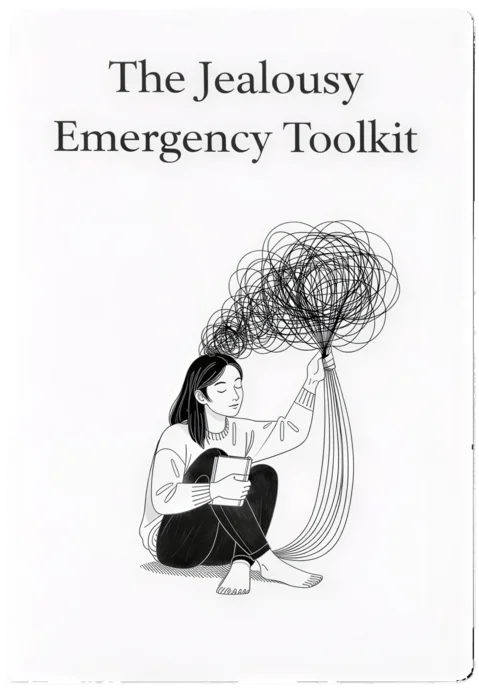Let's be honest here. You've been thinking about it. Maybe it started as a fleeting thought, or perhaps it's been brewing in your mind for months. The idea of opening up your relationship feels both exciting and terrifying. You know what? That's completely normal.
Asking your partner about exploring non-monogamy ranks right up there with other relationship conversation landmines. It's the kind of topic that can either open doors to new adventures or create a crater where your relationship used to be. The stakes feel impossibly high because, well, they kind of are.
Here's the thing though: most people approach this conversation completely wrong. They build up the courage, take a deep breath, and drop the open relationship bomb right on their unsuspecting partner's head. Spoiler alert: this rarely goes well.
Table of Contents
Why the Gentle Approach Actually Works
Think about it this way. Imagine someone walked up to you tomorrow and asked if you'd like to try bungee jumping. If you'd never considered it before, your immediate reaction would probably be somewhere between "absolutely not" and "are you insane?" But if that same person spent weeks talking about extreme sports, showing you videos of people having amazing experiences, and gradually introducing the concept, you might actually warm up to the idea.
The same principle applies here. Your partner's initial reaction to the concept of non-monogamy might be protective, defensive, or even hurt. They might immediately think you're unhappy with them or that they're not enough. These aren't unreasonable reactions; they're human ones.
You know what's interesting though? Research shows that people's attitudes toward relationship structures can evolve over time when they're exposed to new ideas gradually. The key word here is gradually.
Starting Those Crucial Conversations
So how do you actually start testing these waters? The beauty lies in the subtlety. You're not asking permission yet; you're gathering intelligence.
Current events provide perfect conversation starters. When you see a news article about polyamory or open relationships, share it with your partner. "Hey, did you see this article about that celebrity couple? What do you think about their arrangement?" Watch their reaction carefully. Are they dismissive, curious, or somewhere in between?
Movies and TV shows offer another natural entry point. Shows like "You Me Her" or documentaries about alternative relationship styles can spark organic discussions. After watching something together, you might say, "That's interesting how they handle jealousy. I wonder if that actually works in real life."
Social media provides endless opportunities too. When you see posts about relationship diversity, you can gauge your partner's reactions. "My friend shared this post about relationship anarchy. Have you ever heard of that before?"
The goal isn't to convince them of anything yet. You're simply introducing concepts and observing their comfort level with these ideas.
Reading Between the Lines
Pay attention to how your partner responds to these exploratory conversations. Are they asking follow-up questions or shutting down the topic immediately? Do they seem curious about the emotional aspects or focus solely on the physical implications?
Some partners might surprise you with their openness to discussing these topics theoretically. Others might reveal deep-seated beliefs about monogamy that you never knew existed. Both reactions give you valuable information about how to proceed.
If your partner consistently shows interest and asks thoughtful questions, you might be dealing with someone who's naturally curious about relationship diversity. If they seem uncomfortable or change the subject quickly, you'll need to move much more slowly or reconsider your approach entirely.
Listen for language cues too. Do they use terms like "cheating" when discussing consensual non-monogamy? This might indicate some fundamental misunderstandings that need addressing before any deeper conversations can happen.
Deepening the Dialogue
Once you've established that your partner can discuss these topics without immediately shutting down, you can gradually make the conversations more personal. Instead of talking about celebrities or fictional characters, you might explore more philosophical questions.
"Do you think it's possible to love more than one person at the same time?" This question removes the immediate threat of physical intimacy and focuses on emotional capacity.
"What do you think makes relationships work in the long term?" This opens discussions about needs, fulfillment, and relationship satisfaction without directly mentioning non-monogamy.
"How do you define commitment in a relationship?" This helps you understand their fundamental relationship values and whether there's flexibility in their thinking.
These conversations might happen over weeks or months. There's no rush here. Actually, rushing is probably the biggest mistake you can make.
The Real Conversation
Eventually, if the preliminary conversations go well, you'll need to have the actual discussion about your desires. This conversation requires careful preparation and perfect timing.
Choose a moment when you're both relaxed and have plenty of uninterrupted time. Start by acknowledging the conversations you've been having and expressing appreciation for your partner's openness to discussing these topics.
"I've really valued our conversations about different relationship styles lately. They've made me think about what I might want to explore in our own relationship."
Be specific about what you're asking for and why. Vague requests create unnecessary anxiety. Are you interested in emotional connections with others, physical experiences, or both? Are you thinking about occasional encounters or ongoing relationships?
Most importantly, make it clear that this comes from a place of abundance, not scarcity. You're not asking because something is missing in your relationship; you're asking because you want to explore together.
When They Say No
Let's address the elephant in the room. Your partner might say no. They might say it immediately, or they might think about it and then say no. This possibility probably terrifies you, but it's a risk you need to accept before starting any of these conversations.
If they decline, resist the urge to argue or try to convince them. Thank them for considering it and reassure them that you respect their boundary. This isn't the end of the conversation forever, but pushing now will likely damage your relationship.
Sometimes partners need time to process. They might come back weeks or months later with questions or a changed perspective. Sometimes they won't, and that needs to be okay too.
Moving Forward Together
If your partner expresses interest or agrees to explore the possibility, congratulations! You've successfully navigated one of the trickiest conversations in modern relationships. But this is just the beginning.
Now comes the hard work of establishing boundaries, discussing expectations, and figuring out what non-monogamy looks like for your specific relationship. Every couple creates their own rules because every relationship is unique.
Some couples start with theoretical boundaries and adjust as they go. Others prefer to establish detailed agreements upfront. There's no right or wrong approach, only what works for your relationship.
Remember that opening a relationship doesn't solve existing problems. If you're having issues with communication, trust, or intimacy, address those first. Non-monogamy amplifies whatever dynamics already exist in your relationship.
The Bottom Line
Asking your partner about opening your relationship doesn't have to be relationship suicide. With patience, careful communication, and genuine respect for their feelings, you can have these conversations safely.
The testing-the-waters approach protects both of you. It gives your partner time to adjust to new concepts without feeling ambushed. It gives you time to gauge their receptiveness and adjust your approach accordingly. Most importantly, it preserves your relationship's foundation while you explore new possibilities.
Whether your partner ultimately says yes or no, approaching the conversation thoughtfully shows respect for both your desires and their feelings. That's something you can both feel good about, regardless of the outcome.

